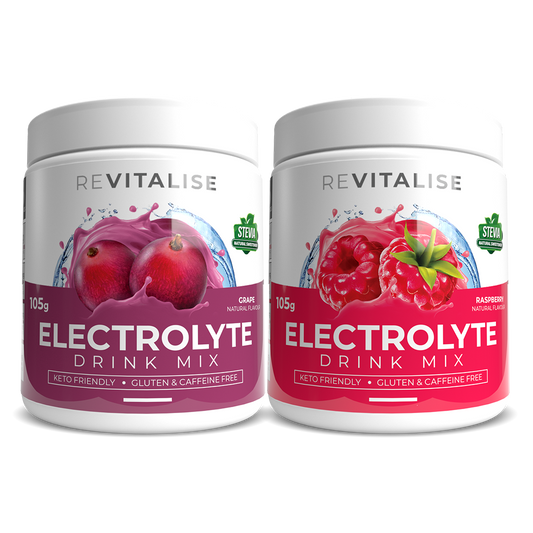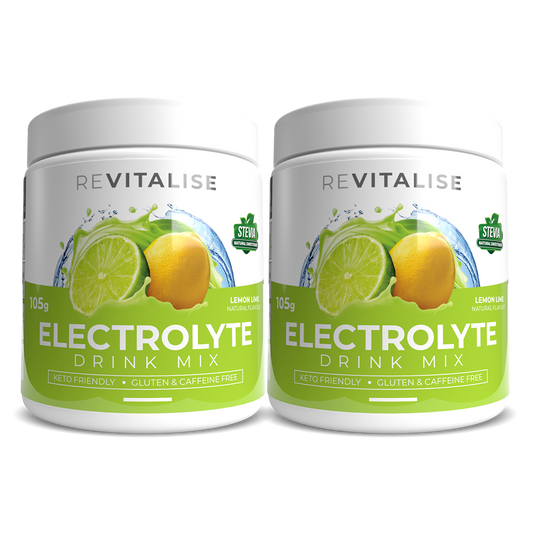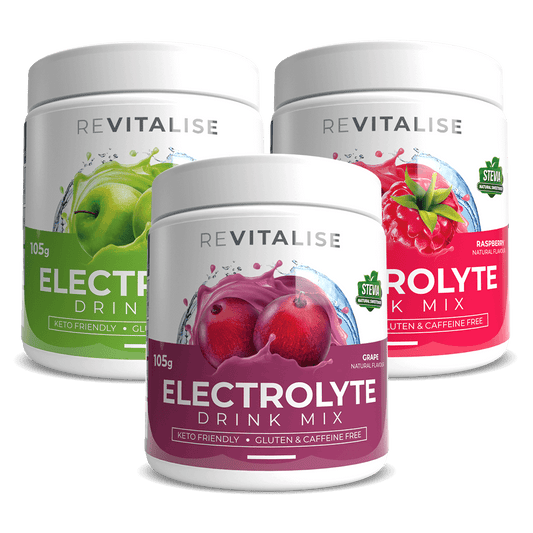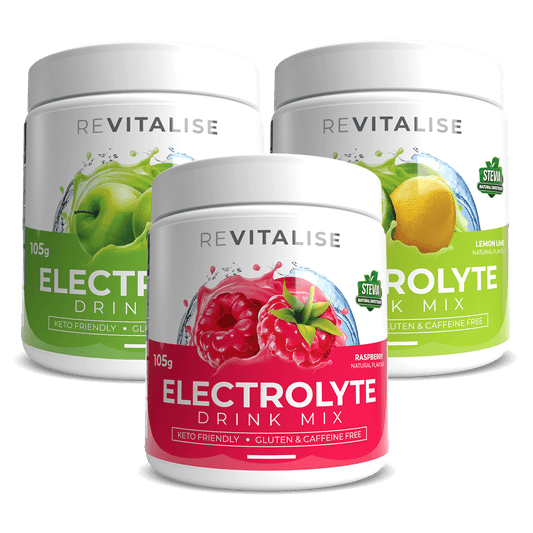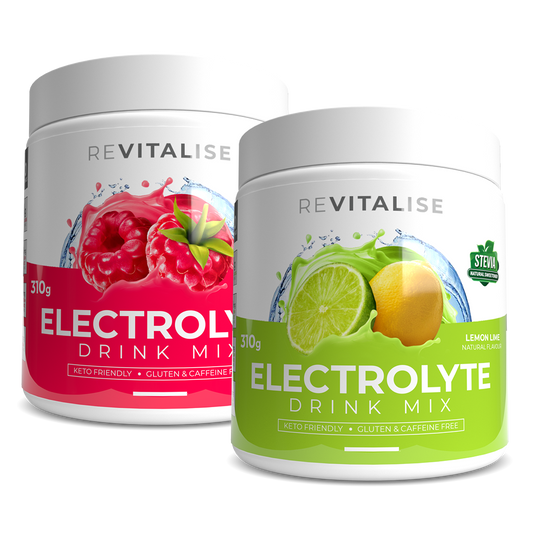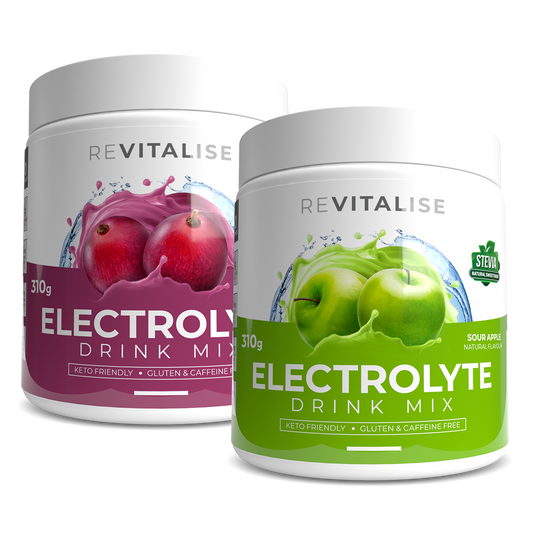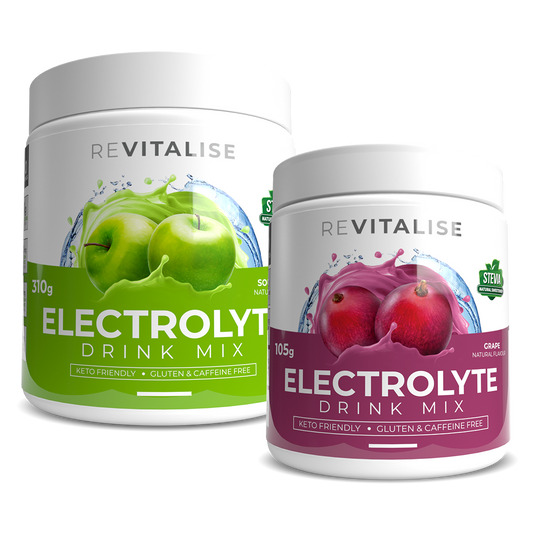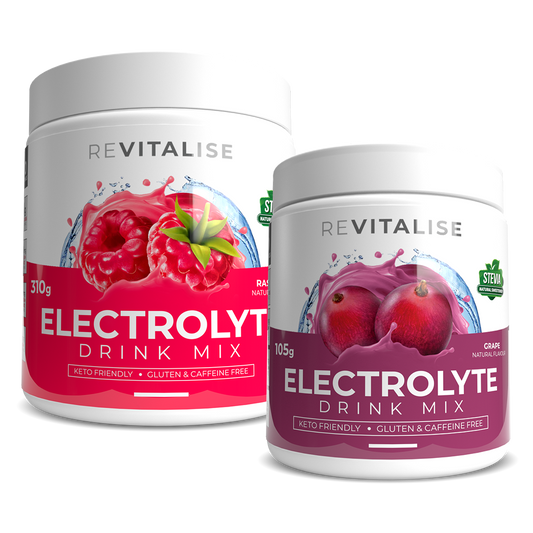Electrolytes are important minerals we need for the proper functioning of our bodies. If your electrolyte levels are off-balance, your overall health is at risk. Generally, we consume enough electrolytes in our everyday food and drinks, but do we have to pay closer attention to our electrolytes while following a Keto diet? The answer is YES!

What Are Electrolytes?
Electrolytes are minerals in your body which carry an electrical charge, allowing for electrical impulses to make muscle cells contract as well as help with chemical reactions to regulate the balance of fluids inside and outside the cells.
There are six main electrolytes, namely sodium, calcium, potassium, chloride, phosphate, and magnesium. They are processed by the liver and kidney to keep your body in homeostasis. Any imbalance of these electrolytes can cause a variety side effects.
What Is The Purpose Of Electrolytes?
- They balance the amount of water in your body;
- They balance your body’s pH levels;
- They move nutrients into your cells;
- They move waste out of your cells;
- They regulate your nerves, muscles, heart, and brain functionality; and
- They help to rebuild any damaged tissue.
What Is The Keto Diet?
The Ketogenic diet, or Keto for short, is a diet where the aim is to send the body into a state of ketosis, which basically means the body starts burning fat for fuel. The Keto diet is aimed at doing just that. This diet promotes replacing carbs with food that is high in fat and protein. There are many benefits for following a Keto diet such as weight-loss and improving the health of your heart and brain.
The Importance Of Electrolytes On Keto Diets
With any diet, having the right balance of electrolytes is important. Since the Keto diet is low-carb, there are more factors to consider when it comes to having the correct balance of electrolytes. The state of ketosis means that your body begins secreting high levels of ketones so that instead of your body running on glucose, it runs on ketones, resulting in your body burning fat. The higher the levels of ketones in your body, the more water and stored electrolytes you lose.
It takes a while for the body to adapt to being in a state of ketosis, and in the beginning of the diet you will be vulnerable to electrolyte deficiencies. This begs the question; do you need electrolyte supplementation on a Keto diet? For the sake of your health and wellness, it is crucial to replenish lost electrolytes.
Symptoms Of Electrolyte Deficiency
Several symptoms can appear when you have an electrolyte imbalance such as:
- Confusion;
- Nausea;
- Dizziness;
- Irregular heartbeat;
- Fatigue;
- Muscle cramps;
- Shortness of breath; and
- Blood pressure changes.
If you notice these symptoms while following the Keto diet, consider increasing your electrolytes.
The Keto Flu
Now you may have heard about the Keto flu and wondering if electrolytes have anything to do with it.
Usually, within the first week of starting the Keto diet, you may experience symptoms such as headache, fatigue and nausea and this is referred to as the Keto flu. These symptoms are similar to the symptoms noticed when there is an electrolyte deficiency.
This is because when following a low-carb diet, such as the Keto diet, your insulin levels drop and the kidneys excrete more sodium. With lower levels of sodium in the body, all the other electrolytes levels are disrupted which causes the “Keto flu” symptoms.
Although your body will adapt to these changes over time, it is always a good idea to supplement with electrolytes when you start the Keto diet and continue throughout in order to prevent symptoms of the Keto flu.
Tips to prevent Electrolyte deficiency while on the Keto Diet
- Consuming enough electrolytes while following the Keto diet can be tricky, but by increasing the amount of vegetables you eat, you will most likely be able to avoid electrolyte deficiencies. Vegetables supply your body with the necessary vitamins and minerals you need. And since vegetable carbs have a low GI, eating them will not get in the way with your body reaching the state of ketosis. The recommended amount of vegetables is 8-10 cups a day.
The best vegetables you can include in your Keto diet are:
- Broccoli;
- Spinach;
- Mushrooms; and
- Cucumber.
- That being said, it is always helpful to take an electrolyte supplement. This ensures that your electrolytes are replenished as your body need it. Do research on the supplement you intend on taking and make sure it contains sodium, potassium, chloride and magnesium.
- Ensure you keep yourself hydrated. Just pay attention to your thirst as that is your body’s way of naturally telling you that you may be dehydrated.
- Start slow. Do not just jump into the Keto diet. By easing your way into the Keto diet, your body will have time to adapt to the changes and this will significantly reduce symptoms of the Keto flu and electrolyte imbalances.
Conclusion
Maintaining a healthy electrolyte balance while on the Keto diet is vital for your body to function. The Keto diet has been proven to improve health and wellness and even promote weight-loss.
By using the strategies such as eating more vegetables, consuming electrolyte supplements, staying hydrated and perhaps not jumping straight into the strict Keto diet will mitigate the potential side effects and even potentially prevent the keto flu symptoms.
If you’re trying to optimise your electrolytes on Keto, try ReVitalise - a refreshing drink packed with electrolytes to keep you hydrated throughout the day.

